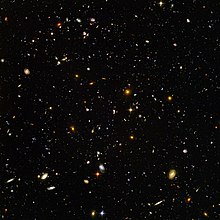Cosmos
This article includes a list of references, related reading, or external links, but its sources remain unclear because it lacks inline citations. (April 2009) |

In its most general sense, a cosmos is an orderly or harmonious system. It originates from a Greek term κόσμος meaning "ordered world" and is the antithetical concept of chaos. Today the word is generally used as a synonym of the word Universe (considered in its orderly aspect). The words cosmetics and cosmetology originate from the same root. In Russian and Bulgarian, the word cosmos simply means "space". In Mandarin Chinese, cosmos is translated as yuzhou, which literally translated means space-time (yu = space + zhou = time).
Philosophy

Pythagoras is said to have been the first philosopher to apply the term cosmos to the Universe, perhaps from application to the starry firmament.
Russian cosmism is a cosmocentric philosophical and cultural movement that emerged in Russia in the early 20th century.
Cosmicism is a philosophical position that mankind is an insignificant aspect of a universe at best indifferent and perhaps hostile. This philosophy, explored by writers such as H.P. Lovecraft (who some say is the original proponent of the philosophy) and later writers who actually represented the beliefs in books such as Hitchhiker's Guide to the Galaxy.
Theology
In theology, the term can be used to denote the created Universe, not including the creator. The Septuagint uses both kosmos and oikumene for the inhabited world. In Christian theology, the word was also used synonymously with aion to refer to "worldly life" or "this world" as opposed to the afterlife.
The cosmos as originated by Pythagoras is parallel to the Zoroastrian term aša, the concept of a divine order, or divinely ordered creation.
Olaf Stapledon, in his science fiction novel Star Maker (1937), describes how God (the Star Maker) evolves by creating ever more complex cosmoses across multicosmic hypertime.
Cosmology

Cosmology is the study of the cosmos in several of the above meanings, depending on context. All cosmologies have in common an attempt to understand the implicit order within the whole of being. In this way, most religions and philosophical systems have a cosmology.

In physical cosmology, the term cosmos is often used in a technical way, referring to a particular space-time continuum within the (postulated) multiverse. Our particular cosmos is generally capitalized as the Cosmos.
Integral Philosophy
The philosopher Ken Wilber uses the term kosmos to refer to all of manifest existence, including various realms of consciousness. The term kosmos so used distinguishes a nondual Universe (which, in his view, includes both noetic and physical aspects) from the strictly physical Universe that is the concern of the traditional sciences.
Ancient Greek conception of the cosmos
The Ancient Greek natural philosopher Archimedes in his essay The Sand Reckoner, estimated the diameter of the cosmos to be the equivalent in stadia of what we call two light years.
Age and size of the cosmos
According to current scientific theory, the cosmos began 13.7 billion years ago short scale in the Big Bang. The current diameter of the observable cosmos is thought to be about 93 billion light years. The diameter of the entire cosmos (assuming the inflation theory to be valid) is thought to be at least between 10 decillion and 10 undecillion light years short scale (this is a lower bound).
See also
- Anthropic principle
- Cosmic View
- Cosmic Zoom
- Cosmology
- Cosmogram
- Cosmography
- Cosmos: A Personal Voyage (Carl Sagan's television documentary series)
- Fate of the universe
- Lambda-CDM model
- Large scale structure of the cosmos
- Macrocosm and microcosm
- Megaverse
- Multiverse
- Observable universe
- Omega Point (Chardin)
- Omega Point (Tipler)
- Timeline of the Big Bang
External links
- Cosmos – an Illustrated Dimensional Journey from microcosmos to macrocosmos – from Digital Nature Agency
- Macrocosm and Microcosm, in Dictionary of the History of Ideas
- Encyclopedia of Cosmos
- merriam-webster.com/dictionary/cosmic
